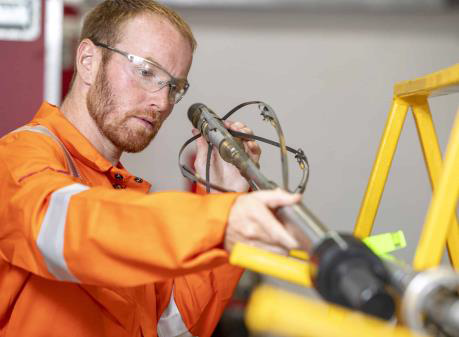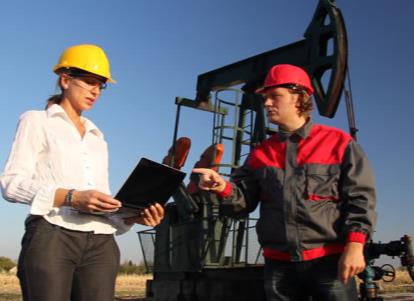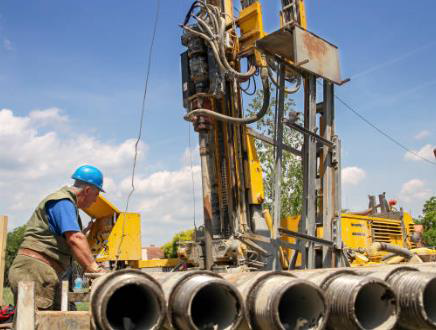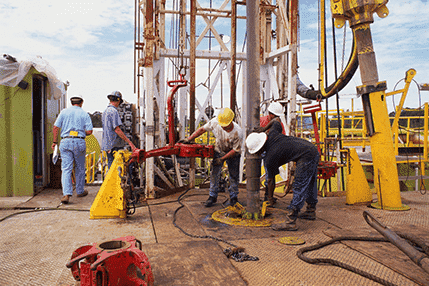COURSE OVERVIEW
DE0867(SI7) : Cased Hole and Production Log Evaluation

OVERVIEW
| COURSE TITLE | : | DE0867(SI7) : Cased Hole and Production Log Evaluation |
| COURSE DATE | : | Sep 08 - Sep 12 2024 |
| DURATION | : | 5 Days |
| INSTRUCTOR | : | Mr. Moammar Khallouf |
| VENUE | : | Doha, Qatar |
| COURSE FEE | : | $ 8500 |
| Request For Course | ||
OTHER SCHEDULED DATES
Course Description
Water identification and fluid and fluid movement in both injection and producing wells are evaluated using spinners, tracers, pulsed neutron oxygen activation, temperature and noise survey. A variety of fluid identification devices are used to evaluate multiphase flow. These tools together are used to quantify the sources water, oil, gas production and are critical to the control of excessive water or other phases. Videos of and in vertical, deviated and horizontal flows are used to aid in visualization of the logging environment.
This course is designed to provide delegates with detailed and up-to-date overview of applied production logging and cased hole & production log evaluation. It covers oil and gas entries from flowmeter/fluid ID and temperature surveys, fluid movement in both injection and producing wells using spinners, tracers, pulsed neutron oxygen activation, temperature and noise survey as well as detecting movement inside/outside of pipe using oxygen activation.
The course will discuss heavy phase “fallback” in flows and select tools to minimize its effect including the various tools used to quantify the sources of water, oil gas production that are critical to the control of excessive water or other phases and the various problems of highly deviated/horizontal well.
Computation of fluid saturations from pulsed neutron (Sigma and C/O) measurements and evaluation of water, oil and gas entry profiles from flowmeter/fluid ID and temperature will also be discussed during the course.
This course is designed to provide delegates with detailed and up-to-date overview of applied production logging and cased hole & production log evaluation. It covers oil and gas entries from flowmeter/fluid ID and temperature surveys, fluid movement in both injection and producing wells using spinners, tracers, pulsed neutron oxygen activation, temperature and noise survey as well as detecting movement inside/outside of pipe using oxygen activation.
The course will discuss heavy phase “fallback” in flows and select tools to minimize its effect including the various tools used to quantify the sources of water, oil gas production that are critical to the control of excessive water or other phases and the various problems of highly deviated/horizontal well.
Computation of fluid saturations from pulsed neutron (Sigma and C/O) measurements and evaluation of water, oil and gas entry profiles from flowmeter/fluid ID and temperature will also be discussed during the course.
TRAINING METHODOLOGY
This interactive training course includes the following training methodologies:
LecturesWorkshops & Work Presentations
Case Studies & Practical Exercises
Videos, Software & Simulators
In an unlikely event, the course instructor may modify the above training methodology for technical reasons.
VIRTUAL TRAINING (IF APPLICABLE)
If this course is delivered online as a Virtual Training, the following limitations will be applicable:
| Certificates | : | Only soft copy certificates will be issued |
| Training Materials | : | Only soft copy materials will be issued |
| Training Methodology | : | 80% theory, 20% practical |
| Training Program | : | 4 hours per day, from 09:30 to 13:30 |
RELATED COURSES

DE0409 : Field Development and Carbonate Reservoir
- Date: Feb 23 - Feb 27 / 3 Days
- Location: Doha, Qatar
- Course Details Register

DE0766 : Advance Drilling Optimization for HPHT Wells
- Date: Feb 02 - Feb 06 / 3 Days
- Location: Doha, Qatar
- Course Details Register

DE0500 : Screening of Oil Reservoirs for Enhanced Oil Recovery
- Date: Jan 12 - Jan 16 / 3 Days
- Location: Dubai, UAE
- Course Details Register

DE0920 : Artificial Lift ESP Downhole Equipment
- Date: Jan 12 - Jan 16 / 3 Days
- Location: Istanbul, Turkey
- Course Details Register
